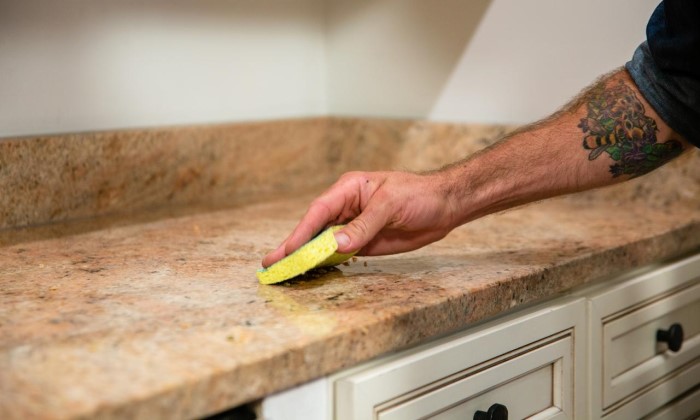Sealants applied to stone countertops don’t last forever, and you should periodically reseal them to protect them from damage. The frequency depends on the type of stone and the quality of sealant, but generally, you should reseal a light-colored stone every two to three years. Darker-colored stones may be left untreated for three to five years. Check the manufacturer’s instructions to ensure your countertops are protected.
Contents
Avoid abrasive cleaners
To preserve the beauty of stone countertops, you should avoid using abrasive cleaning products, and you should wipe spills immediately to prevent further damage. Stones are sensitive to acidic foods and should be handled with care to prevent damage. Acidic foods include wine, citrus juice, vinegar, salad dressings, and beets. Avoid using abrasive cleaners on stone countertops to protect their sealant. Also, don’t cut directly on the surface, as this can cause scratches.
To clean natural stone surfaces, try using a non-abrasive soap or liquid castile soap. Scrub with small, circular motions and avoid scented cleaners. Do not use bleach, as its high alkalinity is corrosive and can remove the protective sealant from your stone countertops. Choose a milder cleaning solution and disinfect the countertop through other means, like a cordless orbital buffer or a scrubbing pad.
Avoid acidic cleaners
If you want your stone countertops to remain beautiful for a long time, you must be extra careful to avoid using acidic cleaners. This will damage the stone and ruin its natural look. Natural stone is porous and can easily stain. To avoid ruining your stone surfaces, always use alkaline cleaners. There are many different types of products that are designed for natural stone surfaces. Below are some examples of the kinds of cleaners you should avoid using on stone countertops.
While acidic cleaners can etch stone, they are still harmful to your countertop’s finish. Acidic cleaners can damage the stone’s natural color by disrupting the chemical bond. This can cause dull spots on the surface. Acidic cleaners can also eat away the stone’s texture, which can cause indentations and erode the surface. Fortunately, there are several ways to prevent etching.
Avoid hot pots and pans on quartz countertops
One way to keep your quartz countertop in good condition is to avoid placing hot pots and pans on it. Hot objects, especially pots and pans that are too hot, can burn the surface. Fortunately, you do not need to use a sealant to protect your quartz countertops. Despite this disadvantage, quartz countertops are easy to clean and don’t absorb liquids. Compared to granite and marble, quartz is more attractive and easier to maintain. The downside of quartz is that it is not as durable as granite and marble, so a few simple precautions can keep your kitchen countertop looking beautiful for years to come.
Another way to protect your quartz countertop is to use hot pads or trivets. These items are specially designed to avoid the risk of scorching and cracking your quartz countertop. Moreover, they contain a treatment that makes them resistant to heat. In addition, trivets and hot pads are a good way to protect your quartz countertop from the damage of hot pots and pans. However, these solutions aren’t guaranteed to work for you.
Avoid scouring creams and powders
Scrubbing with scouring creams and powders can ruin the sealant on stone countertops. Use diluted cleaners near eating and cooking areas. Blot spills with a clean cloth to avoid water spots. Avoid using scouring pads because they can scratch super-hard granite. Also, avoid using acetone and paint thinner to clean stone countertops. If you are concerned about dirt and grime, use a microfiber cloth instead of a paper towel.
You can also use any normal household cleaning solution for soapstone. But never use scouring creams or powders on stone surfaces. Since soapstone is non-porous, food and acid will not stain it. Mineral oil can hide hard water spotting and scratches. However, you should avoid using any acidic cleaners or vinegar on stone surfaces. These products contain abrasives that can damage the surface.
Sealing stone countertops
If you are considering installing a stone countertop in your home, you must understand the importance of sealing them. Regular sealing is essential to keeping your countertop free from stains. Whether the stone countertop is made from granite, marble, soapstone, or another material, it is important to apply sealant once a year. This will prevent stains from oils and other substances from seeping into the stone and destroying the seal. Sealing also helps prevent material erosion and kill bacteria.
Among the most common types of sealants for stone, countertops are oil-based sealers, which are designed to resist moisture. These sealants are also called impregnating stone sealers because they go deeper into the stone than ordinary surface sealers do. Although they are more expensive, they offer greater durability and protect the pricey natural stone countertops.

